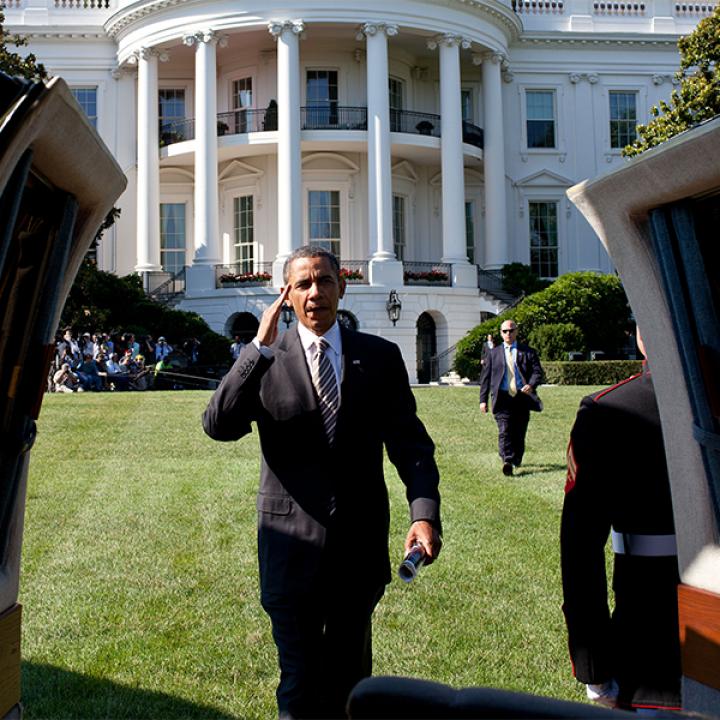

Congratulations on your election victory, Mr. President. Now you have four more years to achieve the lofty goals you have set for yourself. While these are principally domestic, you have also outlined a list of herculean objectives in foreign policy – from climate change to "global zero" to a "new beginning" with the Muslim world (a term from Cairo, circa 2009) to ending the festering sore of the Israeli-Palestinian conflict. Substantial progress on any one of these would (finally) merit a Nobel Prize; progress on all would reserve a spot for you on Mount Rushmore.
But before your advisors convince you that you should invest your second-term mandate on a hunt for a foreign policy legacy, consider a narrow agenda that, in the Middle East at least, focuses on these goals:
-
Determining, once and for all, whether the strategy of diplomacy-plus-sanctions will produce a negotiated agreement to resolve the Iranian nuclear challenge or whether alternative means of coercion, including the use of military force, is necessary to prevent Iran from achieving a nuclear weapons capability;
-
Bringing down the regime of Bashar al-Assad as soon as possible, so as to impose a strategic defeat on Iran, cut the axis of resistance that links Tehran to Damascus and Hizbollah in Beirut, prevent a regionalization of the Syrian conflict, end the suffering of the Syrian people, and prevent the worst outcomes (e.g., a jihadist takeover, a lengthy sectarian war-to-the-finish) from emerging out of the rubble of the Syrian uprising;
-
Preventing the collapse of one or more pro-western monarchies -- Bahrain, Jordan, and Morocco. In this context, Morocco seems to have figured out a recipe for survival and Bahrain has big brother Saudi Arabia looking out for it. The most vulnerable is Jordan, a small, resource-poor buffer state that is a keystone of U.S. interests in the mashreq.
- Avoiding the final death knell for the Palestinian Authority, driven to penury by the false promises of its Arab would-be patrons, which would dash any hope for the eventual return to serious "peace process" diplomacy and open dangerous opportunities for the spread of Hamas influence in the West Bank.
This agenda lacks the drama or the heroism of the arc-bending achievements you may hope to accomplish. But failure to focus on this agenda may earn you precisely the legacy you hope to avoid.
-
Few will recall if you fail to achieve progress on universal denuclearization – "global zero" -- but if the ayatollahs achieve a nuclear weapons capability during the second term, fundamentally transforming the region's balance of power, your epitaph will read: "Barack Obama -- On his watch, Iran got the bomb."
-
Few will recall if your presidency convinces Muslims to tell pollsters they like America any better than they did after your predecessor's, but if the region's pro-West monarchies succumb to the Islamists like the most pro-American republics, Egypt and Tunisia, your epitaph will read: "Barack Obama – On his watch, the Muslim Brotherhood achieved more in eight years than in the previous eighty."
-
Few will recall if you are the sixth president in a row to try and fail to resolve the Israeli-Palestinian conflict, but if the Palestinian Authority collapses and Hamas comes to control the West Bank as it does Gaza, then your epitaph will read: "Barack Obama: On his watch, the potential for peace finally died."
- Few will recall if Libya, a country of little more than six million that has virtually no regional influence, was worth the use of U.S. air power to bring down its cartoonish thug of a dictator, but if either Bashar al-Assad kills his way out of the Syrian uprising after you called for his ouster or radical jihadists are the prime beneficiaries of Assad's eventual collapse, then your epitaph will read: "Barack Obama: On his watch, the struggle for Syria – the lynchpin of the Levant – was lost without America even putting up a fight."
Make this your agenda, Mr. President. Alas, given how much effort you will have to invest just to leave the Middle East in no worse shape when you leave office than it is today, there aren't any medals for catastrophes averted. Still, if you are successful, you can take solace in knowing what won't be chiseled on your epitaph.
Robert Satloff is the executive director of The Washington Institute.
Hoover Institution "Caravan"



